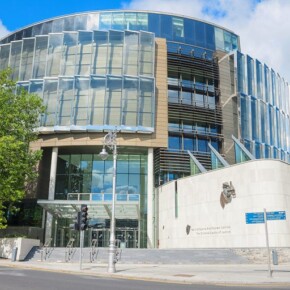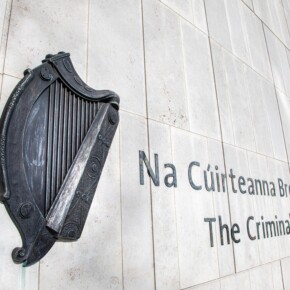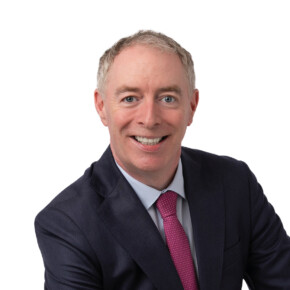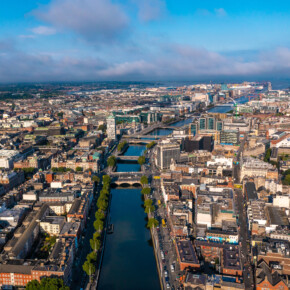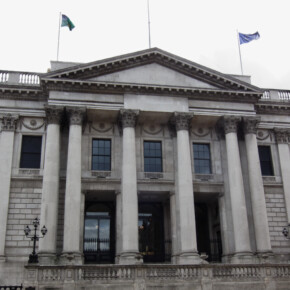How Dublin City Council’s Progressive Alliance collapsed
Mike Finnerty 03 Jul 2024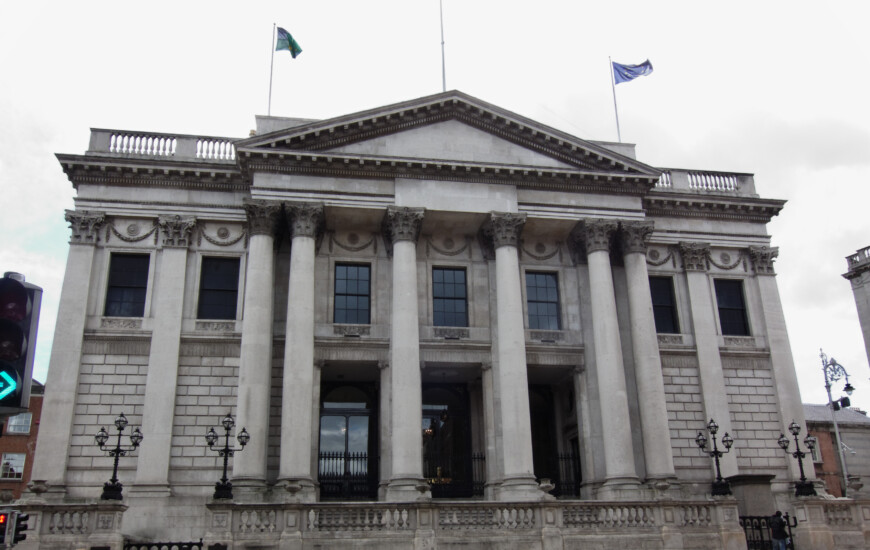
A bid to form a “progressive alliance” on Dublin City Council between the Social Democrats, Sinn Féin, Labour, and the Greens collapsed before the annual meeting of Dublin City Council.
Talks were held before the annual meeting of Dublin City Council on June 21, where the council votes on who will become Lord Mayor for the next year.
Initial talks were held between the four parties, but Labour pulled out of the talks over the issue of Local Property Tax.
The Greens agreed to a repeat of the grand coalition seen in Leinster House (along with Labour support) as the plan was rooted in “practical delivery” according to councillor Michael Pidgeon.
The progressive alliance had enough for 31 seats (Social Democrats on ten, Sinn Féin on nine, Greens on eight and Labour on for) and as it later transpired, had garnered support from left-wing or progressive independents such as Cieran Perry, John Lyons, Barry Henighan and Pat Dunne as well as People Before Profit’s two councillors to lock in the majority.
Trying to ascertain why the talks broke down and what ideological differences is like the classic Kurosawa film Rashomon where the story changes based on who is recalling the events.
Labour’s reasons for walking from Dublin City Council are pretty cut and dry; they wanted a raise in the Local Property Tax, which the Social Democrats and Sinn Féin and the Social Democrats didn’t want to cut.
Labour councillor Darragh Moriarty said “the proposed alliance we’re accused of walking away from doesn’t have the numbers for a majority. It also wants to maintain the status quo of gifting away millions in tax cuts through the Local Property Tax.”
“These funds are not just numbers on a spreadsheet; they translate into real, tangible improvements for Dubliners. They could be used for investing in our capital city’s infrastructure, including parks, pitches, public realm improvements, cleaner streets and other facilities that both Labour and the Social Democrats campaigned on during the election.”
The Greens’ reasons for baulking at a progressive alliance seem more rooted in self-interest; they want to stay sweet with their senior coalition partners in a general election year and adhere to the more pragmatic wing of the party than the more idealistic fundamentalist wing.
The Social Democrats and Sinn Féin have seemingly found common ground on major issues which is good news for both parties; the Social Democrats have told the electorate they are not willing to prop up a Fianna Fáil or Fine Gael-led government be it local or national, while Sinn Féin has found a potential coalition partner (which polling and actual hard results tells us, the party badly needs).
Both the Social Democrats and Sinn Féin were in agreement that the Local Property Tax should not be cut, tackling poverty and crime were major issues for them, and both parties had no qualms about inviting People Before Profit into talks after Labour and the Greens pulled out of talks.
When the vote for Lord Mayor came up on Dublin City Council, Fine Gael’s James Geoghegan won by 32 votes to the 25 votes won by Daniel Ennis of the Social Democrats.
Ennis was the candidate put forward by the Social Democrats’ grouping of 10 councillors, Sinn Féin’s 9 councillors, and People Before Profit’s 2 councillors, as well as securing support from Perry, Henighan, Lyons and Dunne.
The next five years will see parties from the left-of-centre lick their wounds and attempt to present a united front in 2029.
However, to come so close to locking Fianna Fáil and Fine Gael out of power and have it fall apart over ideological differences is sure to rankle those in the progressive alliance.
Had Ennis been elected as Lord Mayor, it would have been the first time a Social Democrats councillor held the role.
Instead, the Lord Mayor role went to Fine Gael for the first time since 2012 with James Geoghegan winning the vote with Green councillor Donna Cooney serving as his Deputy.
Daithí Doolan, Sinn Féin’s leader on Dublin City Council said “this progressive alliance offers a real alternative to the conservative politics of Fianna Fáil and Fine Gael. Our programme for the next five years aims to deliver a City for all.”
“Housing, community safety, public services & tackling climate change are the cornerstones of this important agreement. Sinn Féin is committed to working with other parties and the council management to deliver on this agreement.”
“Labour’s slogan for the recent European elections was ‘for the love of Dublin’. Good luck to them trying to explain that one to their voters after the actions of their city councillors. It simply doesn’t tally,” he said.
Cat O’Driscoll, leader of the Social Democrats on Dublin City Council, said it was necessary for a united progressive front in the face of far-right electoral success.
She noted, “we have seen a rise of the far-right which is partly driven by continued underinvestment in social and public services.”
Indeed, Fine Gael’s victory in the vote for Lord Mayor of Dublin was achieved in part thanks to the abstentions of anti-immigrant independent councillors Malachy Steenson and Gavin Pepper.
In O’Driscoll’s view, decades of Fianna Fáil and Fine Gael governance have contributed to the feeling of degradation across Dublin, and the progressive alliance would have gone some way to solving the issue.
“Throughout the local elections campaign, we heard from people who are struggling to heat homes, access services and feel unsafe in their city – we are very disappointed that the Greens and Labour left our talks to and missed a valuable opportunity to form a left-leaning alliance on Dublin City Council.”
In 2019, Fianna Fáil, Social Democrats, Labour and The Greens teamed up to run Dublin City Council, but five years is a long time in politics.
The Social Democrats teaming up with Fianna Fáil in 2019 (albeit with five seats compared to Fianna Fáil’s 11) could be read as the party, which had only been formed less than four years prior, teaming up with a more senior government party to win gravitas.
In 2024, the stakes are drastically different for the Social Democrats, who ended up winning 10 seats on Dublin City Council and overall had a strong set of local election results not only in Dublin, but right across Ireland precisely because they were a strong opposition to the government.
During the local election campaign, the party made no qualms about where they stood on major issues (in many cases, it can be argued that they were further to the left than Sinn Féin on a many number of issues) and were rewarded for it.
By drawing a line in the sand in the post-election milieu, the party has made it clear they would not negotiate with Fianna Fáil or Fine Gael in a bid to differentiate themselves further from the pack and keep the supporters who rewarded them so richly on June 7.
As far as Sinn Féin are concerned, the most recent set of results can only be described as a missed opportunity – after running 30 candidates on Dublin City Council and only having nine candidates to show for it, the feeling within the party is that this exact situation could have been avoided if the party didn’t spread themselves too thin.
In areas where the party ran four candidates and only got one elected, the party believes that running just two candidates would have been the better course of action.
The Social Democrats’ double victory in Artane-Whitehall for candidates Jesslyn Henry and Aisling Silke built off a strong win for Patricia Roe in 2019 and made further inroads with the local electorate – something that Sinn Féin seemed utterly incapable of achieving on June 7.
In the same constituency, Sinn Féin ran four candidates and only got Edel Moran elected (as well as the loss of Larry O Toole’s seat).
In Cabra-Glasnevin, home of party leader Mary Lou McDonald, the party ran four candidates and only got one candidate, Seamus McGrattan, across the line for their trouble.
Fine Gael, by contrast (and in the backyard of Minister Paschal Donohoe), ran two candidates and both candidates, Colm O’Rourke and Gayle Ralph, easily won seats.
As far as Fine Gael are concerned, the progressive alliance taking part in a re-enactment of Life Of Brian “splitters” bit couldn’t have come at a better time for the party.
“I intend to put all my energy and focus into representing the city that I love and to deliver solutions to some of the challenges faced by the capital’s communities and businesses”, said Geoghegan following his election as Lord Mayor.
“My priorities as a councillor over the last four and a half years have been on the delivery of homes for young people, tackling anti-social behaviour and crime, and ensuring we have an inclusive society where families and individuals can enjoy a good quality of life.”
With Geoghegan running for a Dáil seat in Dublin Bay South within the next nine months, his performance as Lord Mayor is now an audition for Leinster House.


